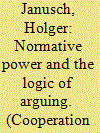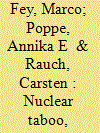|
|
|
Sort Order |
|
|
|
Items / Page
|
|
|
|
|
|
|
| Srl | Item |
| 1 |
ID:
149496


|
|
|
|
|
| Summary/Abstract |
The concept of Europe as a normative power can be understood as a theoretical attempt to define a new type of protagonist in world politics, distinct from older concepts such as empire, hegemonic power, or great power. Because many scholars have used universal norms as a criterion for ‘normative power Europe’, the concept is often criticized as hidden Eurocentrism, soft imperialism, or hegemony. In this article, a normative power is defined not by the universality of the norms it seeks to diffuse, but by the underlying logic according to which it acts. A normative power takes communicative actions and acts in accordance with the logic of arguing, not consequentialism. This definition of normative power escapes the trap of a hidden Eurocentric imperialism by abstracting the theoretical concept from the specific case of Europe and detaching it from the criterion of universal norms.
|
|
|
|
|
|
|
|
|
|
|
|
|
|
|
|
| 2 |
ID:
147323


|
|
|
|
|
| Summary/Abstract |
The nuclear age has been characterized by an emerging and now well-established norm of nuclear non-use, the ‘nuclear taboo’. In the realistic and naturalistic setting of the science-fiction TV series Battlestar Galactica, however, nuclear weapons are used frequently and at times massively. Claiming that science fiction can function as an illuminating ‘mirror’ for international relations scholarship and that we can learn something from ‘second-order’ (fictional) worlds, this article explores potential in-show reasons that render the absence of a nuclear taboo plausible within the universe of Battlestar Galactica. We turn to the central pillars of the nuclear taboo in the real world and find them reversed in the show: nuclear weapons are (depicted as) ‘clean’, international institutions are absent, and the enemy is socially constructed as a ‘radical other’, thus rendering the possibility, if not likelihood, of nuclear war plausible. With these insights, we return to our world and argue that, particularly during the years of the George W Bush presidency, the erosion tendencies of the nuclear taboo were indeed quite serious: technological progress and growing political inclination expedited plans to develop usable nuclear weapons, arms control regimes came under considerable strain, and opponents were portrayed as ‘unjust enemies’ or ‘rogues’.
|
|
|
|
|
|
|
|
|
|
|
|
|
|
|
|
|
|
|
|
|